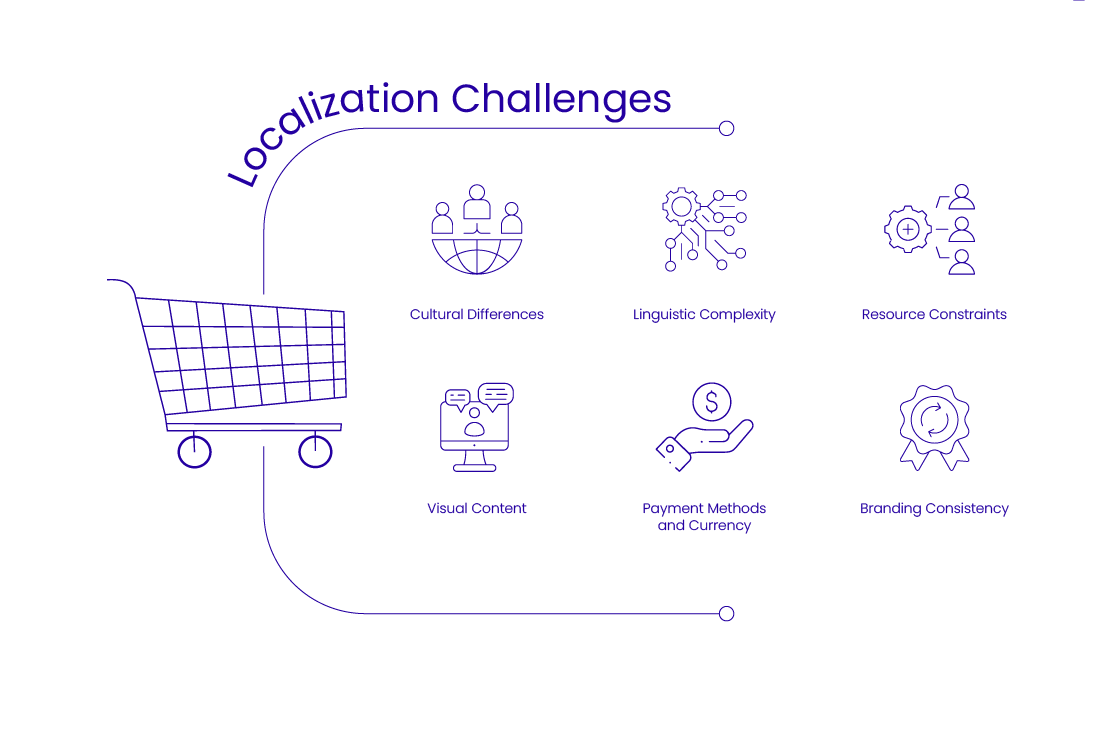AI-powered ecommerce localization signifies the incorporation of artificial intelligence to remodel online retail content and experiences according to different geographical aspects such as market, culture, and currency. This concept extends beyond simple transactions, including modifications to product descriptions and prices, and even marketing messages. In other words, localization with the help of AI enables businesses to expand their global reach in a more efficient and effective way, along with enhancing the rate of customer engagement and satisfaction.
Table of Contents:
The core of AI Localization includes machine learning algorithms to assess huge amounts of data, including consumer behavior, language differences, and cultural preferences. For online retailers, AI localization is a game-changer. This lets new markets/businesses climb into new markets, and decreases the time and resources needed for expansion. By offering relevant experience on a local basis, businesses (small, medium, and large) can drastically enhance customer conversion rates & loyalty throughout diverse global audiences.
Rise & impact of AI-powered localization for ecommerce
Although the exact date for birth of AI-powered ecommerce localization cannot be specified, its initiation can be considered with the introduction of customized suggestions by ecommerce companies in the late 1990s. Over the course of time, AI continued and is still evolving in ecommerce with its implementation in various key areas in AI ecommerce personalization solutions such as AI-powered customer support, customized suggestions of products, and automated generation of product descriptions in various languages.

To understand the overall impact of AI-powered ecommerce localization for business owners, it is important to first scope out the areas where it made the most impact.
-
Customized & multilingual content: AI can evaluate customer data for customizing product suggestions, marketing messages, and website content according to the geographical location, region, and language; thereby, offering a more personalized & relevant shopping experience.
-
Enhanced interaction: With AI-powered virtual assistants, ecommerce businesses can offer 24/7 support in multilingual manner, catering enhanced customer experience.
-
Automated translation: AI powered localization comes with powerful translation tools that can easily & accurately decipher large volumes of data (mainly text), decreasing time related to any traditional translation.
-
Simplified operations: AI simplifies localization tasks such as adapting product descriptions, marketing materials, and website contents, ensuring streamlined operations while reducing use of human resources.
-
Global scalability: AI localization facilitates businesses to venture into new international markets without having to undertake higher expenses or tackle logistic hurdles.
-
Increased time to market: AI localization facilitates businesses launching products and relevant marketing campaigns much faster.
-
Competitive advantage: Businesses, investing in AI localization, have been seen to experience a better level of positioning in the competitive global market since the localization via AI goes in sync with customer expectations and experiences in different geographic locations.
Next, we need to have a clear picture of the high-level impact of AI localization on ROI, along with its global market penetration potential.
ROI or Return-Over-Investment has always been the most concerning aspect of every business, be it small, medium, or large. Every business desire to earn higher or at least nearer returns in comparison to the expenses made. Incorporating AI-powered ecommerce localization impacts ROI to a greater extent. Better ROI indicates that customers are happy with your product/service.
AI-Powered Ecommerce Localization for Global Expansion– the new initiative
When we talk about Global ecommerce, it is the strategy of selling products & services throughout the international borders via online platforms. This strategy is a great means for businesses to expand their branches, solidify their presence in the international market, and increase revenue generation by acquiring new customers.
Why is traditional localization no longer enough?
Prior to the advent of AI powered localization, there was this traditional means of incorporating localization. This approach focused on deciphering text and basic cultural elements. However, it is no longer popular because this strategy somehow fails to meet the needs of diverse global audiences. With a diversified audience on a global scale, let’s take a quick look at why traditional localization fails:
Missed connection opportunities: Traditional localization failed to capture a market with a diversified audience. This drives the connection-building opportunities away from businesses.
Limited impact on customer engagement & sales: Content like product description or marketing material that isn’t localized as per the target audience leads to a reduced rate of sales, even to the extent of hampering brand reputation.
Weakened brand identity: Improper branding & messaging throughout different markets in various geographic locations likely confuses the audience, leading to negative impact on the brand.
Read More:
The demand for real-time personalization on a scale
In the current market scenario, the demand for real-time personalization in ecommerce is on the rise, especially driven by the expectations of customers as well as potential benefits to the business. Consumers expect personalized communications, and they favor brands that meet those expectations. And those brands enjoy better customer loyalty, better conversion rates, and increased revenue.
And that’s why real-time personalization is becoming a major differentiator in today’s competitive ecommerce landscape.
Let’s take a quick peek at the major aspects of real-time personalization in ecommerce:
-
Meeting Customer Expectations: On the one hand, a large majority of consumers expect personalized interactions, whereas on the other, a significant percentage get frustrated when these are absent.
-
Enhanced Customer Experience: Real-time personalization creates a more engaging and relevant shopping journey by tailoring content, recommendations, and offers based on individual customer behavior.
-
Increased Conversion Rates: Personalized recommendations and targeted marketing can lead to higher conversion rates as customers are more likely to find what they’re looking for and make a purchase.
-
Improved Customer Loyalty: Personalized experiences foster stronger customer relationships, making them more likely to return and become loyal customers.
-
Competitive Advantage: Businesses that effectively utilize real-time personalization can distinguish themselves from competitors offering a one-size-fits-all approach.
-
Operational Efficiency: AI-powered personalization can automate tasks like customer interactions and dynamic pricing, freeing up businesses to focus on strategic initiatives.
With information about the major aspects, let us also learn about the different benefits related to real-time personalization.
-
Increased Revenue: Personalized experiences can lead to higher sales and revenue.
-
Improved Customer Engagement: Tailored content and offers keep customers engaged and encourage them to explore the website further.
-
Enhanced Customer Satisfaction: Personalized experiences lead to a more satisfying shopping experience, which can boost customer satisfaction.
-
Reduced Cart Abandonment: By offering relevant products and addressing customer needs in real-time, businesses can reduce cart abandonment rates.
CXO Pain Points
Ecommerce localization presents several key challenges, primarily revolving around accurately adapting to diverse cultural norms, languages, and legal landscapes. These challenges extend beyond simple translation to encompass cultural nuances in design, marketing, and customer service.
Challenges Faced During Ecommerce Localization
Businesses face operational hurdles in managing multiple languages, currencies, payment methods, and ensuring consistent branding across different platforms.

-
Cultural Differences: Failing to account for cultural sensitivities can lead to miscommunication, offense, or a lack of engagement with the target audience. For example, brands that are using lots of color combinations in their marketing should understand that colors have different symbolic meanings across cultures, and using the wrong ones can negatively impact a brand’s image.
-
Visual Content: Images, videos, and other visual elements need to be culturally relevant and relatable to the target market. It is vital to remember small things; for example, a simple hand gesture is considered rude in one culture while promoting a product.
-
Linguistic Complexity: Beyond direct translation, localization requires adapting idioms, colloquialisms, and regional dialects to ensure clarity and avoid misunderstandings. Managing multiple languages on a website can present technical challenges related to character encoding, text direction, and content display.
-
Payment Methods and Currency: Customers prefer using familiar payment methods, and offering only a limited selection can deter sales. Accurate and transparent currency conversion is essential for building trust and preventing confusion.
-
Resource Constraints: Localization is usually expensive as it requires extensive investment in various areas such as translation and market research. Plus, the overall process of localization is quite time consuming, often leading to unnecessary delays in product launches. Last but not least, localization needs the best combination of expertise in terms of culture, language, and linguistics.
-
Branding Consistency: Adapting to local markets while preserving brand identity requires careful planning and execution. Ensuring a consistent brand message across different platforms and languages is essential for building trust.
By understanding and addressing these challenges, ecommerce businesses can successfully navigate the complexities of localization and expand their reach to international markets.
AI powered localization – a strategic solution
AI-powered localization is a strategic approach which incorporates artificial intelligence for upgrading the overall process of adapting products, services, and content for different markets based on their geographies, culture, and linguistic presence. It involves employing AI technologies like machine learning and natural language processing to enhance accuracy, efficiency, and speed in localization workflows.
How is AI bridging the gap between personalization and localization?
Communicating with consumers on a global scale is vital for ecommerce businesses to flourish. That’s the reason why more stress is being put on language translation and localization. Over the years, this field underwent drastic changes because of the introduction of artificial intelligence.
Let’s examine some of the most significant ways in which AI localization impacts customer experience while understanding how to personalize eCommerce content with AI.
Enhanced Speed: AI significantly accelerates the translation process. Automated systems can translate vast amounts of text in a fraction of the time it would take human translators, thereby increase efficiency and reduce turnaround times.
Cost Efficiency: By automating translation tasks, AI helps businesses save on the costs associated with hiring human translators. While professional translators are still crucial for specialized tasks, especially where quality is paramount, AI-driven solutions offer a cost-effective alternative for routine translation needs.
Integration with Content Management Systems: AI-powered translation tools seamlessly integrate with CMS platforms, enabling automated translation workflows within existing content management workflows. This integration streamlines the translation process and reduces manual effort for content managers.
Customization and Personalization: AI enables localization efforts to be tailored more precisely to specific target audiences. Through data analysis and machine learning, AI algorithms can adapt translations based on regional dialects, cultural preferences and other demographic factors, ensuring content resonates effectively with diverse audiences.
Improved Accuracy: AI-powered translation algorithms continually learn and refine their understanding of languages, leading to higher accuracy levels than traditional methods. Through machine learning techniques, AI systems can recognize patterns and nuances in language, resulting in more precise translations.
Consistency Across Platforms: AI-powered translation tools ensure language usage and terminology consistency across various platforms and channels. This consistency is vital for maintaining brand identity and messaging integrity across global markets, which leads to customer trust and loyalty.
Continuous Improvement: AI-driven translation systems continuously evolve and improve over time. As they process more data and receive feedback, they become increasingly accurate and adept at handling complex linguistic challenges, ensuring ongoing enhancements in translation quality.
Recommended Reading:
Connecting pain points of CXOs with AI centric solutions
AI-powered localization solutions can address several pain points for CXOs, including high costs, slow turnaround times, and inconsistent quality in multilingual content delivery. By automating translation and localization processes, AI can significantly reduce expenses, accelerate content delivery, and improve the consistency of messaging across different languages and markets, ultimately delivering custom ecommerce experiences using AI localization to drive business growth.
Here’s a breakdown of how AI localization addresses specific CXO pain points:
-
Cost Reduction: Traditional localization includes expenditures related to quality assurance, human translators, and project managers. With AI algorithms automating a huge chunk of the translation process, reducing the need for extensive human intervention and lowering costs significantly. Also, ai localization streamlines workflows, reduces errors, and enhances efficiency, resulting more cost savings.
-
Speed and Efficiency: Manual translation of the contents is a huge bottleneck, leading to delay in product launches and market expansion. AI can translate large volumes of content quickly, enabling faster time-to-market for products and services in new regions. With its real-time translation capability, AI eases in better customer support interactions and other communication needs resulting in better customer satisfaction & experience.
-
Quality and Consistency: Manual translation often leads to inconsistencies in style, use of terminology, and tonality usually ending up in harming brand reputation. On the other hand, AI can be tutored or trained to maintain consistent terminology, style guides, and brand voice across all translated content, ensuring a unified brand experience.
-
Adaptability: AI localization solutions adapt to new languages and markets, allowing businesses to easily expand their global reach. Plus, AI can be easily customized to meet the specific content types and other business requirements.
-
Improved Customer Experience: AI assesses customer data to prepare customized content & support in their native language, enhancing customer experience.
In essence, AI-powered ecommerce localization solutions empower CXOs to achieve global growth by addressing key pain points related to cost, speed, quality, and customer experience. They enable businesses to expand their reach, improve customer satisfaction, and ultimately drive revenue growth.
Conclusion: From Artificial to Advantageous AI
AI powered localization should be a boardroom conversation because it extremely impacts business growth, efficiency, and global market competitiveness. AI enhances and automates the localization processes, resulting in faster turnaround times, cost savings, and improved cultural sensitivity, which are crucial for successful global expansion. Ignoring AI in localization risks falling behind competitors and missing out on valuable market opportunities.
Takeaway for CXOs
AI-powered localization has evolved from being a generic tech trend to a competitive necessity. For today’s CXOs navigating fragmented markets, inconsistent branding, and rising customer expectations, AI offers a strategic lever to drive scalable global growth without bloating overhead. By merging real-time personalization with cultural precision, AI-driven global market penetration is a dream come true; it transforms localization from a cost center into a revenue-driven engine.
This isn’t just about translating content—it’s about translating value across every touchpoint, in every market, in real time. The result? Faster market entry, stronger brand trust, and significantly higher ROI.












 Magento AI Integration: Transform Your eCommerce Store Into an AI-Driven Revenue Engine
Magento AI Integration: Transform Your eCommerce Store Into an AI-Driven Revenue Engine  Sync Magento Store with Other B2C Ecommerce Platforms: A Guide to Multichannel Integration
Sync Magento Store with Other B2C Ecommerce Platforms: A Guide to Multichannel Integration  MACH Architecture for Unified Global Multi-Store Ecommerce: The Future of Headless Commerce
MACH Architecture for Unified Global Multi-Store Ecommerce: The Future of Headless Commerce  Setting Up Global Ecommerce Stores Without Duplicating Infrastructure
Setting Up Global Ecommerce Stores Without Duplicating Infrastructure 

